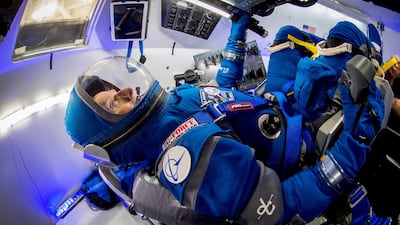The UAE has approved a manned spaceflight programme and could begin training the first Emirati astronauts as early as next year, according to a senior government official.
Salem Humaid Al Marri, Assistant Director General at the Mohammed Bin Rashid Space Centre, said that putting a UAE astronaut in orbit was part of a “sustainable” human spaceflight programme with a serious purpose, rather than simply for prestige.
“This is an initiative from the UAE government to have a sustainable human spaceflight programme," Mr Al Marri told a panel discussion at the 68th International Astronautical Congress in Australia.
The Government would formally seek applications for astronaut training by the end of this year or the first quarter of 2018, he said
After between six to eight months, a final selection of four to six astronauts would be made. The number would be kept small, he told the IAC, "because obviously all of the astronauts that we train, we would also look to fly them at some point".
“When we talk about sustainable, that means that we are not looking at launching an astronaut for a week or launching a tourist flight, but we’re looking at a programme that is based on science," he said.
https://www.youtube.com/watch?v=QrSomFEDXGc
The intention was to have the first UAE astronaut in space by 2021, in time for the country’s 50th anniversary.
Mr Al Marri said no decision had been made about how the first UAE astronaut would go into orbit.
“We do envisage that we partner up with all of the major space agencies, somehow and in some structure,” he said.
There are a growing number of options. Next year, Boeing will begin the first flights of its Starliner capsule.
The Starliner can accommodate up to seven astronauts, including passengers, and is designed for low Earth orbit and specifically to supply the International Space Station.
Chris Ferguson, Boeing's director of Starliner crew and mission systems, recently outlined the plans to The National.
“We’ll provide safe service back and forth to the space station for up to five astronauts at one time," he said.
“They’ll launch, within 24 hours they’ll get to the International Space Station, they’ll stay there for up to six months and then they’ll return to one of five western United States landing spots within six hours of undocking.
Also close to manned space flight is Elon Musk’s SpaceX Dragon capsule, due to blast off in the next 12 months.
Musk has claimed the manned Dragon will even fly the first space tourists in an orbit around the Moon by the end of 2018.
A third option is the Russian Soyuz rocket, currently the only spacecraft able to take astronauts to the ISS.
It is likely that the first Emirati astronaut would make the ISS their destination, to conduct scientific experiments and learn more about the impact of long term space flight on humans.
Read more: The UAE's journey to space
Recent months have seen a growing number of space projects announced by the UAE.
2021 will also see the arrival of the space probe Hope, as the climax of the Emirates Mars Mission, a joint project with the Mohammed bin Rashid and UAE Space Centres.
It will be the first mission to the Red Planet by a Muslim country, and will carry out scientific research while orbiting the planet.
Last week saw the announcement of Mars Science City, a Dh500 million project that will simulate what will be needed for human colonisation of the planet, using a series of huge domes.
The UAE leadership has also set the goal of building a city on Mars by 2117.
Read more: City dedicated to researching Mars colonisation
Mr Al Marri said that UAE astronauts could continue research begun at Mars Science City while in space.
“We look at that as a natural next step in the progression of testing some of our experiments and ideas in the ISS and the space environment,” he said.
Dubai has also been chosen to host the IAC Congress in 2020.
.


